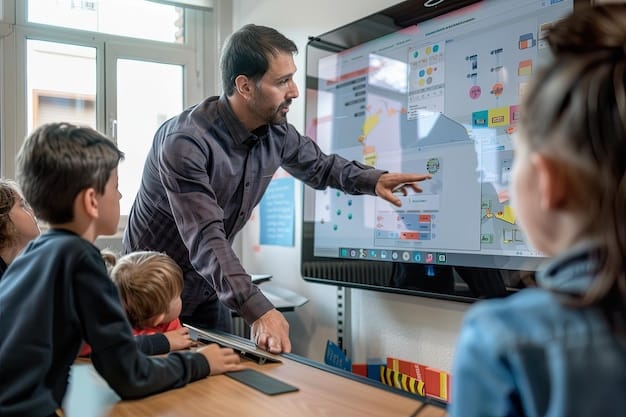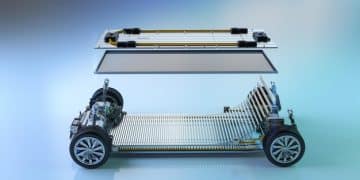AI-Powered Personalized Education: Latest US Developments

The latest developments in AI-powered personalized education in the US include adaptive learning platforms, AI tutors, data analytics for student performance, and AI-driven content creation, all aimed at enhancing individual learning experiences.
What are the latest advancements shaping the landscape of education in the United States? The integration of artificial intelligence is revolutionizing traditional methods, paving the way for AI-powered personalized education. Let’s explore how AI is transforming learning in the US.
Exploring the Rise of AI in US Education
Artificial Intelligence (AI) is increasingly becoming a pivotal tool in transforming education across the United States. The integration of AI technologies aims to personalize learning experiences, making education more effective and tailored to individual student needs. This shift involves a variety of innovative approaches, from adaptive learning platforms to AI-driven content creation.
The implementation of AI in education not only optimizes the learning path for each student but also provides educators with valuable insights into student performance. These insights allow teachers to adjust their teaching strategies and provide targeted support. Let’s delve deeper into the current trends and possibilities.
AI-Driven Adaptive Learning Platforms
Adaptive learning platforms are at the forefront of AI’s impact on education. These systems analyze student performance in real-time to tailor the difficulty and pace of the material presented. This ensures each student is continually challenged and supported.
Such platforms can detect learning gaps and automatically adjust the curriculum to address these weaknesses. This personalized approach helps students master concepts more thoroughly and efficiently, reducing frustration and increasing engagement.
The Role of AI Tutors
AI tutors are another significant development, providing students with personalized support and guidance. These virtual tutors can answer questions, provide feedback, and offer customized learning paths, supplementing the work of human teachers.
Unlike traditional tutoring, AI tutors are available 24/7, allowing students to receive assistance whenever they need it. This constant availability makes learning more accessible and flexible. Additionally, AI tutors can track student progress and provide data-driven insights to educators.
- Personalized Learning Paths: AI designs customized learning paths based on individual student needs and strengths.
- Real-Time Feedback: AI tutors offer immediate feedback, helping students correct mistakes and reinforce learning.
- 24/7 Availability: AI tutors are accessible at any time, making learning more flexible.
- Data-Driven Insights: AI tracks student progress, giving teachers valuable insights.
In summary, AI is playing a crucial role in improving educational outcomes by providing personalized and adaptive learning experiences. These advancements are enhancing student engagement and enabling educators to deliver more effective instruction.
Personalized Learning Paths with AI
AI has significantly contributed to the creation of personalized learning paths in US education. By analyzing individual student data, AI algorithms can identify unique learning styles, strengths, and weaknesses. This analysis enables the design of customized educational plans that cater to each student’s specific needs.
These personalized paths can include recommending relevant content, adjusting the difficulty level of assignments, and providing targeted feedback. The goal is to optimize the learning experience and ensure that students progress at their own pace.
Optimizing Content Delivery
AI algorithms can analyze how students interact with different types of content, such as videos, articles, and interactive exercises. Based on this analysis, the system can recommend the most effective content formats for each student, enhancing comprehension and retention.
Furthermore, AI can adapt the presentation style of the content to match individual preferences. For example, some students may benefit from visual aids, while others may prefer text-based explanations. This level of customization ensures that content is delivered in the most engaging and effective way possible.
Adaptive Assessment Techniques
Traditional assessments often fail to capture the full spectrum of a student’s abilities. AI-powered assessment tools can provide a more comprehensive and nuanced evaluation. These tools can adapt questions based on a student’s performance, ensuring that assessments are neither too easy nor too difficult.
In addition to adaptive testing, AI can analyze student responses to identify common errors and misconceptions. This information can be used to provide targeted feedback and personalized remediation, helping students overcome specific learning challenges.

- Data-Driven Customization: AI uses data to tailor learning paths to individual needs.
- Optimized Content Delivery: AI recommends the most effective content formats for each student.
- Adaptive Assessment: AI adjusts assessment difficulty based on performance.
- Targeted Feedback: AI identifies common errors and provides personalized remediation.
In conclusion, the use of AI to create personalized learning paths is transforming the educational landscape in the US. By leveraging data-driven insights and adaptive technologies, AI is enabling educators to deliver more effective and engaging instruction, while also empowering students to take ownership of their learning journey.
Data Analytics and Student Performance
Data analytics is another critical area where AI is making substantial contributions to education in the US. By collecting and analyzing vast amounts of student data, AI can provide educators with invaluable insights into student performance, identifying trends and patterns that would otherwise go unnoticed.
This data-driven approach enables teachers to make more informed decisions about their teaching strategies, curriculum design, and resource allocation. Data analytics can also help identify students who may be struggling and provide them with timely support and intervention.
Predictive Analytics in Education
Predictive analytics uses AI algorithms to forecast future student performance based on historical data. This allows educators to identify students who are at risk of falling behind and implement proactive measures to support their success.
For example, predictive analytics can identify students who are likely to drop out of school based on factors such as attendance, grades, and socioeconomic background. By identifying these students early on, educators can provide them with targeted interventions, such as tutoring, counseling, and mentorship programs.
Identifying Learning Gaps
AI can analyze student performance data to identify specific learning gaps and areas where students are struggling. This information can be used to tailor instruction and provide targeted support to address these weaknesses.
For instance, AI can analyze student responses on quizzes and assignments to identify common errors and misconceptions. This allows teachers to adjust their teaching methods and provide additional instruction on specific topics that students find challenging. Additionally, AI can recommend personalized learning resources to help students fill in these gaps.
- Predictive Analytics: AI forecasts student performance, enabling proactive support.
- Learning Gap Identification: AI identifies specific areas where students are struggling.
- Data-Driven Decision Making: Educators use data to inform teaching strategies and resource allocation.
- Personalized Interventions: AI helps tailor support to address individual student needs.
Ultimately, data analytics is transforming education in the US by empowering educators with the information they need to make more informed decisions and provide better support to their students. This data-driven approach is helping to improve student outcomes and create a more equitable learning environment.

AI-Driven Content Creation
AI is not only transforming how students learn but also how educational content is created. AI-driven content creation tools are enabling educators to generate high-quality, personalized learning materials more efficiently. These tools can automate many of the time-consuming tasks involved in content creation, freeing up educators to focus on teaching and student interaction.
From generating practice questions to creating interactive simulations, AI is helping to make learning more engaging and effective. This technology also ensures content is up-to-date and relevant, addressing the evolving needs of students in the 21st century.
Automated Question Generation
Creating a diverse range of practice questions is essential for reinforcing learning. AI tools can automatically generate questions based on specific learning objectives and content. These tools can also create different question types, such as multiple-choice, true/false, and open-ended questions.
Automated question generation not only saves time but also ensures that students have access to a wide variety of practice opportunities. This helps them to develop a deeper understanding of the material and improve their problem-solving skills.
Interactive Simulations and Virtual Labs
Interactive simulations and virtual labs offer students hands-on learning experiences that are not always possible in traditional classrooms. AI can be used to create realistic simulations of complex systems and processes, allowing students to explore and experiment in a safe and controlled environment.
These simulations can be particularly valuable in subjects such as science, engineering, and medicine, where real-world experiments can be costly, dangerous, or impractical. AI-driven simulations can also be personalized to match individual student learning styles and needs.
- Automated Question Generation: AI generates diverse practice questions efficiently.
- Interactive Simulations: AI creates realistic simulations for hands-on learning.
- Personalized Content: AI tailors content to individual student needs.
- Time Savings: AI automates content creation, freeing up educators.
In summary, AI-driven content creation is revolutionizing the way educational materials are produced, making learning more engaging, personalized, and effective. These tools are empowering educators to deliver high-quality instruction while freeing up their time to focus on student interaction and individual support.
Addressing Challenges and Ethical Considerations
While AI offers numerous benefits to education, it is essential to address the associated challenges and ethical considerations. Issues such as data privacy, algorithmic bias, and the digital divide must be carefully managed to ensure that AI is used responsibly and equitably in education.
By addressing these challenges proactively, we can ensure that AI is used to enhance learning for all students, regardless of their background or circumstances. Transparency, accountability, and ethical guidelines are essential for responsible AI implementation.
Data Privacy and Security
The use of AI in education involves collecting and analyzing vast amounts of student data. It is crucial to ensure that this data is protected from unauthorized access and misuse. Schools and educational institutions must implement robust data privacy and security measures to safeguard students’ personal information.
In addition to technical safeguards, it is also important to provide students and parents with clear and transparent information about how their data is being used. This can help build trust and ensure that everyone is comfortable with the use of AI in education.
Algorithmic Bias
AI algorithms are trained on data, and if that data reflects existing biases, the algorithms can perpetuate and even amplify those biases. This can lead to unfair or discriminatory outcomes for certain groups of students. For example, if an AI-powered assessment tool is trained on data that primarily reflects the performance of high-achieving students, it may underestimate the abilities of students from disadvantaged backgrounds.
- Data Privacy: Ensuring student data is protected and used responsibly.
- Algorithmic Bias: Addressing and mitigating biases in AI algorithms.
- Digital Divide: Ensuring equitable access to AI-powered education.
- Ethical Guidelines: Establishing guidelines for responsible AI use.
In conclusion, by addressing the challenges and ethical considerations associated with AI, we can ensure that it is used responsibly and equitably in education. This will help to create a more inclusive and effective learning environment for all students.
Future Trends in AI-Powered Education
The future of AI-powered education in the US holds tremendous promise. As AI technology continues to advance, we can expect even more innovative applications that transform teaching and learning. From enhanced personalization to augmented reality integration, AI is poised to shape the future of education in profound ways.
By embracing these future trends and investing in AI research and development, the US can maintain its leadership in education technology and create a world-class learning system that prepares students for success in the 21st century.
AI-Enhanced Personalized Learning
The personalized learning experiences provided by AI will become even more sophisticated in the future. AI algorithms will be able to analyze a wider range of data, including student learning styles, preferences, and emotional states, to create highly customized learning paths.
AI-powered tutoring systems will become more interactive and engaging, providing students with personalized feedback and support in real-time. These systems will also be able to adapt to a student’s emotional state, providing encouragement and motivation when needed.
Augmented Reality (AR) Integration
Augmented Reality (AR) offers exciting possibilities for enhancing learning experiences. By overlaying digital information onto the real world, AR can make learning more immersive and interactive. Imagine students using AR to explore the human body in detail or to rebuild historical events in their classroom.
AI can play a crucial role in creating and personalizing AR learning experiences. AI algorithms can analyze student interactions with AR content to provide personalized feedback and adapt the experience to match individual learning styles.
- Enhanced Personalization: AI creates highly customized learning paths based on diverse data.
- AR Integration: Augmented Reality enhances learning with immersive experiences.
- AI-Driven Assessment: AI provides more accurate and comprehensive assessments.
- Global Collaboration: AI facilitates collaboration among students worldwide.
In summary, the future of AI-powered education in the US is bright. By embracing these trends and addressing the associated challenges, we can create a learning system that prepares students for success in a rapidly changing world.
| Key Element | Brief Description |
|---|---|
| 🤖 AI Tutors | Provide 24/7 personalized learning. |
| 📊 Data Analytics | Offers insights into student performance. |
| ✍️ Content Creation | Aids in generating personalized learning content. |
| 🛡️ Data Privacy | Ensures protection of student data. |
Frequently Asked Questions
▼
AI tutors analyze student performance data to provide customized learning paths, feedback, and support. They adapt to the student’s learning style and pace.
▼
Data analytics offers educators critical insights into student performance, aiding informed decisions and targeted support to improve learning outcomes efficiently.
▼
AI tools efficiently generate practice questions and interactive simulations, enabling personalized learning material creation while saving educators time spent preparing content.
▼
Key ethical considerations include safeguarding data privacy, addressing algorithmic biases, ensuring digital access equity and establishing guidelines for AI’s responsible educational usage comprehensively.
▼
Expect enhanced personalization, augmented reality (AR) integration, AI-driven assessments, and facilitation of global collaboration as significant advances evolving education further.
Conclusion
AI-powered personalized education is fundamentally reshaping the learning landscape in the US. By embracing these advancements while addressing ethical considerations, we can unlock the full potential of AI to create a more equitable and effective education system for all students.





